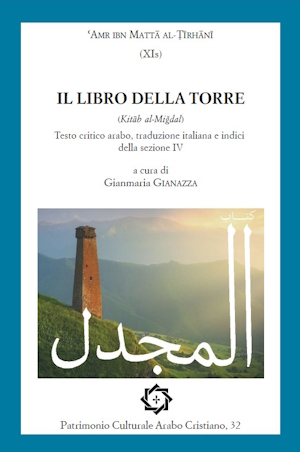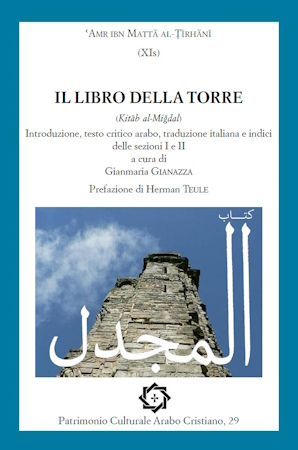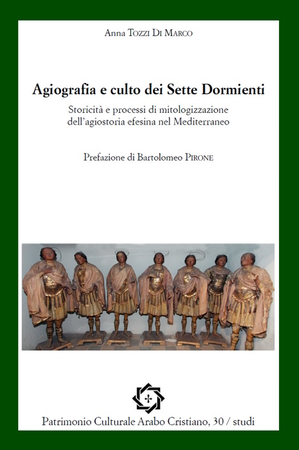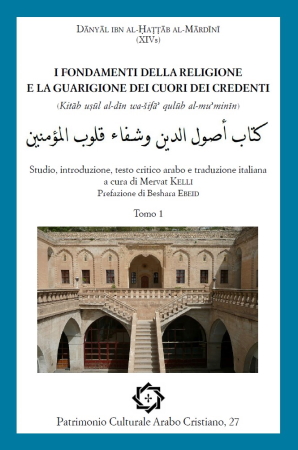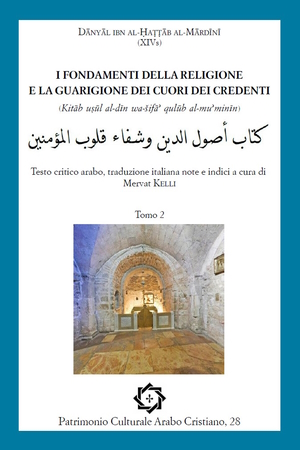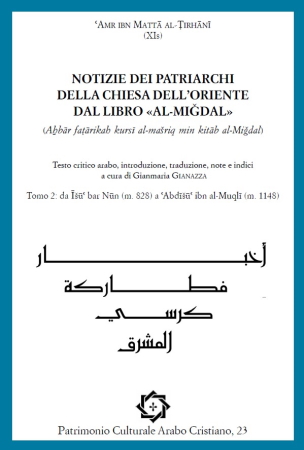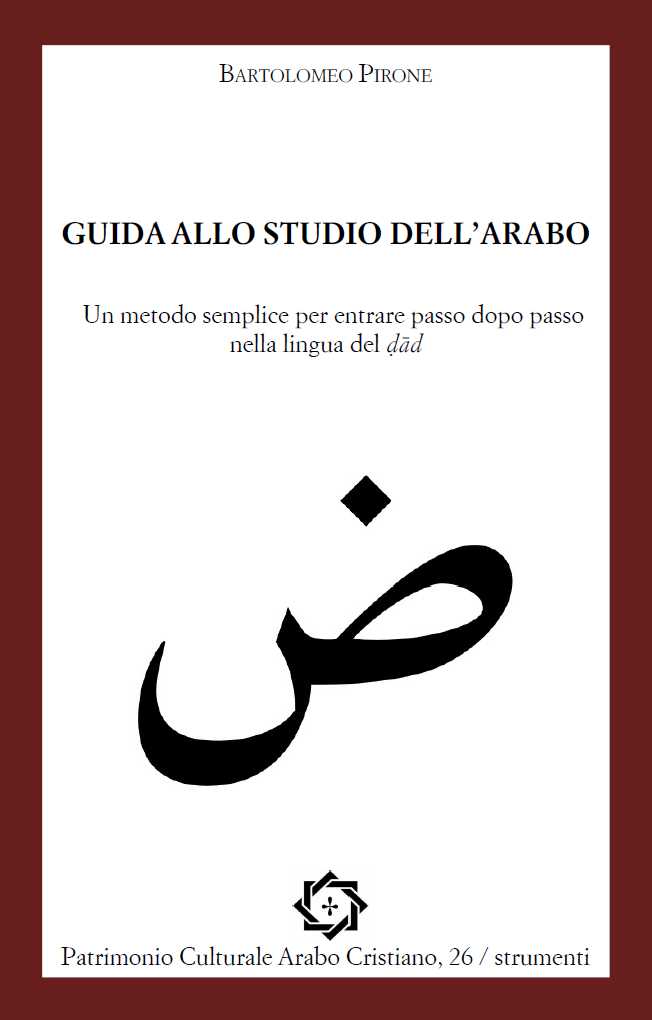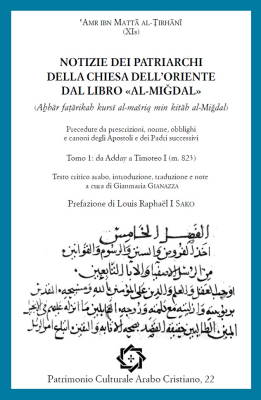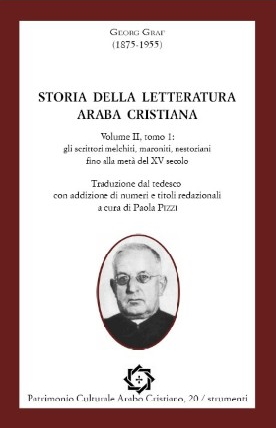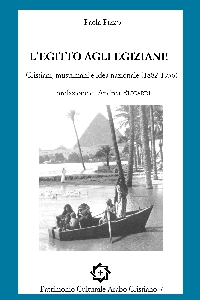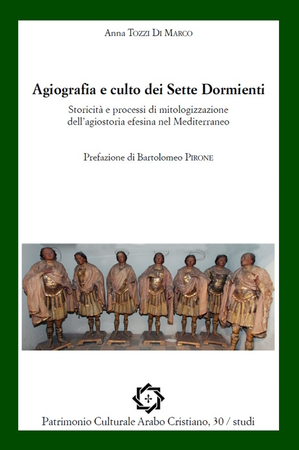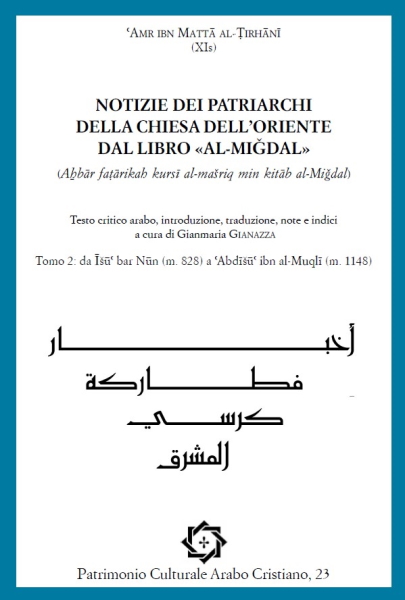Anna Tozzi Di Marco, Agiografia e culto dei Sette Dormienti. Storicità e processi di mi
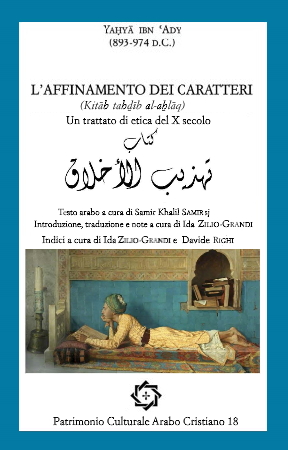
PCAC 18
Yaḥyā Ibn ʿAdī, L'affinamento dei caratteri. (Kitāb tahḏīb al-aḫlāq). Un trattato di etica del X secolo, edizione a cura di Samir Khalil Samir; introduzione, traduzione e note a cura di Ida Zilio Grandi; indici a cura di Ida Zilio-Grandi e Davide Righi, Bologna 2019, independently published.
ISBN: 978-1985163577
Compendium of rational ethics in the form of a systematic treatise, the Tahḏīb al-aḫlāq ("The refinement of the characters") of Yaḥyā ibn ʿAdī disregards a properly religious way and instead moves on the ground of Greek philosophical reflection and also on that of a simpler reasonableness. Precisely the absence of religious references meant that it was attributed over time to Muslim authors, such as al-Ǧāḥiẓ of Basra, Ibn al-ʿArabī of Murcia, or the mathematician, physicist and astronomer Ibn al-Hayṯam.
Among the earliest and most important examples of Arabic literature on the ethical topic, «The refinement of the characters» of Yaḥyā ibn ʿAdī teaches and illustrates a journey of personal improvement. Rich and meticulous, vast in content and generous in intent, this small text composed in the 10th century Baghdad can speak with intelligent simplicity even to the contemporary reader.
- Details
- Category: PCAC Series (EN)
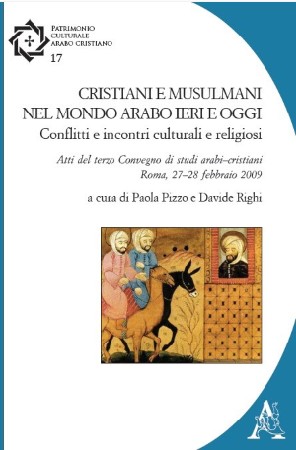
PCAC 17
Paola Pizzo - Davide Righi (eds), Cristiani e musulmani nel mondo arabo ieri e oggi: conflitti e incontri culturali e religiosi. Atti del 3° convegno di studi arabo-cristiani. Roma 27-28 febbraio 2009 (Roma: Aracne 2019).
ISBN: 9788825517903
 Buy now the PDF of the book or a copy with hard cover on editor Aracne site
Buy now the PDF of the book or a copy with hard cover on editor Aracne site
Papers by:
Vincenzo Poggi sj: All’origine della tolleranza islamica
Bartolomeo Pirone: Cristiani e musulmani negli Annali di Eutichio
Davide Righi: Bernardo di Chiaravalle e la sua predicazione della seconda crociata
Wafik Nasry: Signs and Miracles
Salvatore Santoro: Timoteo I e il califfo al-Mahdī. Prima forma di un dialogo islamo-cristiano
Philippe Luisier: I Copti e la quinta crociata. A proposito di un colofone della Biblioteca Apostolica Vaticana
Rosanna Budelli: Identità araba e identità cristiana: il contributo di Buṭrus al-Bustānī (m. 1883) alla riforma linguistica della Nahḍah
Paola Pizzo: L’evoluzione del pensiero islamico sulla condizione dei non musulmani
Samir Khalil Samir sj: Il dialogo islamo-cristiano da Regensburg (12/09/2006) ad oggi
- Details
- Category: PCAC Series (EN)
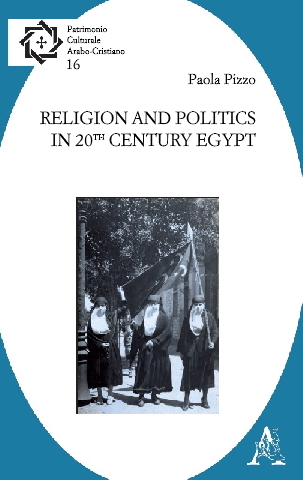
PCAC 16
Paola Pizzo, Religion and Politics in 20th Century Egypt, (Roma: Aracne 2019)
The volume traces Coptic-Muslim relations in the light of the Egyptian political events of the first three decades of 20th century, relying mainly on original documents from the British, Egyptian, French and Italian archives. It was a relationship that oscillated between moments of confrontation and collaboration in the framework of the Egyptian national movement and the anti-colonial struggle.
The book focuses on the period between the two world wars, a very lively historical moment for the two major religious communities in the country, where, on the one hand, nationalism was tinging itself with Islam, leading to the formation of the first modern Islamic political movement, the Muslim Brotherhood, while the Coptic community was experiencing a profound renewal, alternating between events of community activism and withdrawal.
- Details
- Category: PCAC Series (EN)
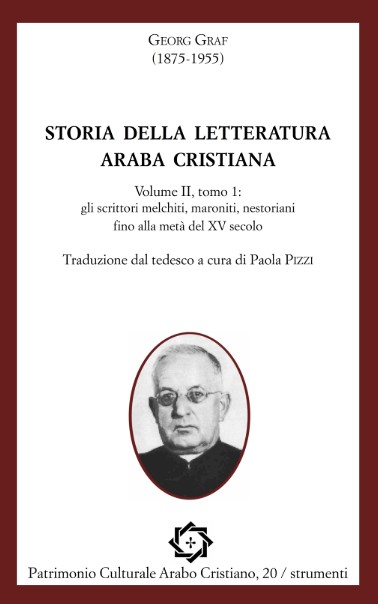
PCAC 20 / strumenti
Georg GRAF, Storia della letteratura araba cristiana. Gli scrittori melchiti, maroniti, nestoriani fino alla metà del XV secolo, vol. II tomo 1, traduzione dal tedesco con addizione di numeri e titoli redazionali a cura di Paola PIZZI.
(It is the italian translation of the first part of GCAL 2nd volume until page 219. No bibliographical update was made. Instrument of work for students who can read italian)
Independent publication by Gruppo di Ricerca Arabo-Cristiana, Bologna 2018.
ISBN: 978-1729133682
- Details
- Category: PCAC Series (EN)
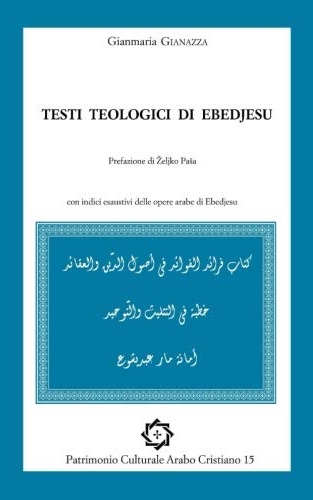
Gianmaria Gianazza, Testi teologici di Ebedjesu, prefazione di Željko Paša [edizione araba e traduzione italiana di alcune opere teologiche di ʿAbdisho bar Berīkā (Ebedjesu), Le perle delle utilità sui fondamenti della religione e gli articoli di fede (Kitāb farāʾid al-fawāʾid fī uṣūl al-dīn wa-l-ʿaqāʾid; كتاب فرائد الفوائد في أصول الدين والعقائد); Sermone sulla Trinità e l'Unità (Ḫuṭbah fī al-taṯlīṯ wa-l-tawḥīd; خطبة في التثليث والتوحيد); Professione di fede di Abdisho di Nisibi (Amānah mār ʿAbdisho; أمانة مار عبديشوع); La perla sulla verità del cristianesimo, tradotti dall'arabo e dal siriaco] (Bologna: CreateSpace 2018).
ISBN: 978-1986847872
"As some of those who believe (i.e. Muslims) and Jews have thought of Christians badly, by tying them with polytheism and disbelief in the things they believe in, [...] we felt compelled to explain in this book the number of things that they consider repugnant among the statements of Christians, bearing evidence on their need and credibility, among them their affirmation that God is one in three persons, Christ is the son of God, taking the cross as direction in their churches, convents and places of worship, and bowing before it and venerating it"
(from the introduction of The pearls of utility on the foundations of religion and articles of faith «Kitāb farāʾid al-fawāʾid fī uṣūl al-dīn wa-l-ʿaqāʾid»)
Theological vision of Abdisho bar Berika (Ebedjesu 1250ca-1318) in four of his theological writings.
By ʿAbdisho bar Berīkā (Ebedjesu) see also (Kitāb uṣūl al-dīn - كتاب أصول الدين) «I fondamenti della religione» (The foundations of religion)
- Details
- Category: PCAC Series (EN)
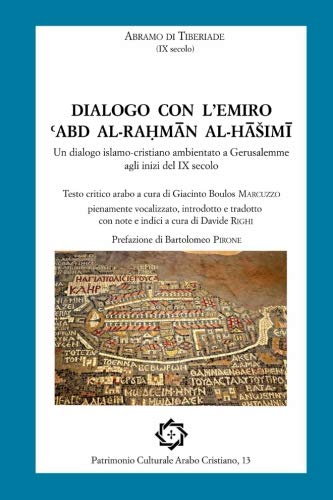
Abramo di Tiberiade, Dialogo con l'emiroʿAbd al-Raḥmān al-Hāšimī. Un dialogo islamo-cristiano ambientato a Gerusalemme agli inizi del IX secolo, testo critico arabo tratto dall'edizione a cura di Giacinto Boulos Marcuzzo, pienamente vocalizzato, introdotto, tradotto, con note ed indici a cura di Davide Righi. Prefazione di Bartolomeo Pirone (Bologna: CreateSpace, 2018).
476 pages, ISBN: 978-1985205642
Arabic text and italian front page translation.
حوار مع الأمير عبد الرحمان الهاشميّ
حوار إسلامي مسيحي في القدس في بداية القرن التاسع
Famous account of an Islamic-Christian dialogue attributed to the monk Abraham of Tiberias held in the ninth century in Jerusalem.
Although with Elements that may call into Question its Historicity, the Work reflects a Dialogue that was truly held in Jerusalem in the early Decades of the ninth Century in the Presence of Muslim Authority and Muslim Sages. The dialogue was very well known during Middle Ages and was widely copied and transmitted.
- Details
- Category: PCAC Series (EN)
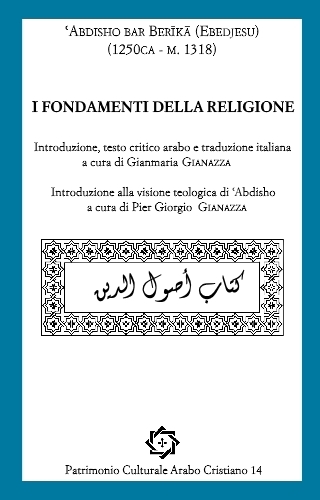
ʿAbdisho bar Berīkā (Ebedjesu), I fondamenti della religione. «Kitāb uṣūl al-dīn», Introduzione, testo critico arabo e traduzione italiana a cura di Gianmaria Gianazza, introduzione alla visione teologica di ʿAbdisho a cura di Pier Giorgio Gianazza (Bologna: CreateSpace, 2018), ISBN 978-1985252790.
The Christian religion cannot be denigrated... I will show in this book, with the help of the Lord of lords, the truth of those opinions and beliefs, and the preciousness of the foundations of the truths and useful things contained therein, so that the error of those who refute their truth, without reflection and examination, may be manifest and be true for those who believe and accept them that, if taken into account, are devoid of errors and mistakes. (from the beginning of the work)
Mirabile synthesis of the Christian faith written in prose rhymed by the metropolitan bishop of Nisibis 'Abdisho bar Berīkā (Ebedjesu) (1250ca-1318)
By ʿAbdisho bar Berīkā (Ebedjesu) see also (theological writings by Abdisho - مؤلفات دينية لعبديشوع) «Scritti teologici di Ebedjesu)
كتاب فرائد الفوائد في أصول الدّين والعقائد
- Details
- Category: PCAC Series (EN)
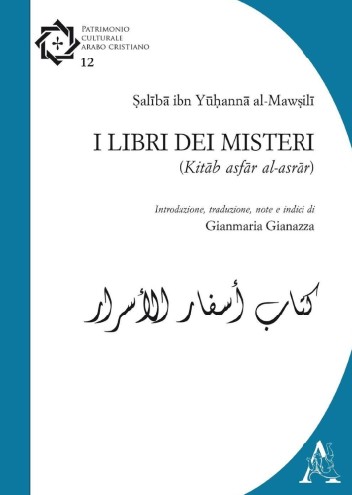
The twelfth publication of PCAC series: PCAC 12
Ṣalībā ibn Yūḥannā al-Mawṣilī, I libri dei misteri (Kitāb asfār al-asrār), Introduction, italian translation, notes and indexes by Gianmaria Gianazza, ed. Aracne, Roma 2017, 984p., ISBN 9788854892460
 Buy now the PDF of the book or a copy with hard cover on editor Aracne site
Buy now the PDF of the book or a copy with hard cover on editor Aracne site
The publication is a religious historical work of the fourteenth century, in five books:
- Details
- Category: PCAC Series (EN)
Read more: PCAC 12 (Patrimonio Culturale Arabo Cristiano vol. #12) (EN)

Series directed by
Bartolomeo Pirone
There is nothing wrong with the title of this new series of studies titled The Treasures of Arabic Christian Culture. Although many people may be surprised in seeing the words Arab and Christian in the same sentence, Arabs were present at the first Pentecost and received the baptism of the Holy Spirit (Acts 2:11). Later some Arab tribes accepted Christianity, invented the Arabic script, and formed the first kingdoms in the Arabian Peninsula long before the rise of Islam.
After the rise of Islam, other Middle Eastern Christian communities, Syriac, Melkite, and Coptic, also came to be «Arabized» to a significant degree. A Christianity inspired by the Fathers of the Church but thinking in Arabic grew up in this environment. It re-examined the Christian heritage as it came into contact with a new religion, Islam, and for the first time Christians weighed their beliefs against those of another faith.
These Christians preserved and synthesized the scientific and philosophic inheritance of the Hellenic world and because of this the Muslim Caliphs of Baghdad and Damascus sought them out as court physicians and councilors.
They transmitted this treasure, through translations and commentaries on the medical treatises of Galen and Hippocrates, the philosophy of Plato, Aristotle, and their disciples, and the scientific works of Euclid and Ptolemy. They were students of Greek learning and they began in the 9th century a renaissance in the Arab world that three centuries later spread to the West.
Beginning in the 16th century, these Arab Christians came to study in the West and when they returned home they built modern colleges in Lebanon, founded printing houses, and disseminated the methodology of the scientific revolution. As they brought learning from the west to the east so also they became in the 17th and 18th centuries the first Orientalists, introducing Westerners to Middle Eastern culture, both Christian and Muslim. In the 19th century, they were the first promoters of the nahda, a second Arab renaissance, starting newspapers and other publications, reviving theatre, novels, and later the cinema.
Even so, these Arab Christians, being no less Arab than their Muslim counterparts, were not taken seriously in the Western world. In the endless fascination with all that was «different», they were dismissed as «charming» and «exotic». Because their faith was so similar to that of the West, because they were so oppressed by their Ottoman overlords, and because they were so few in numbers, they were ignored by Western intellectuals, attracting the attention only of those missionaries that sought to «evangelize» them.
In order to remedy this serious gap of knowledge about the Arab Christian world, the present series, The Treasures of Arabic Christian Culture is being offered to scholars and interested readers in Italy and all of Europe.
Samir Khalil Samir
- Details
- Category: PCAC Series (EN)
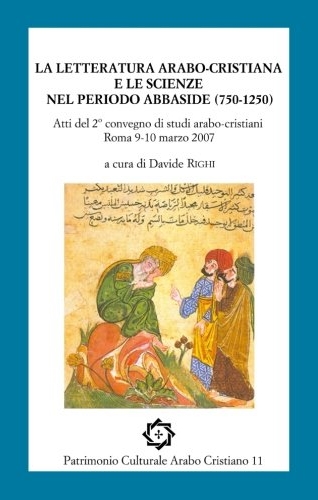
La letteratura arabo-cristiana e le scienze nel periodo abbaside (750-1250 d.C.). Atti del 2º convegno di studi arabo-cristiani, Roma 9-10 marzo 2007, a cura di Davide Righi, 331p, 2nd edition Bologna 2017, $ 17.50 isbn 978-1534769410
Papers presented include:
- Details
- Category: PCAC Series (EN)
Read more: PCAC 11 (Patrimonio Culturale Arabo Cristiano vol. #11) (EN)


